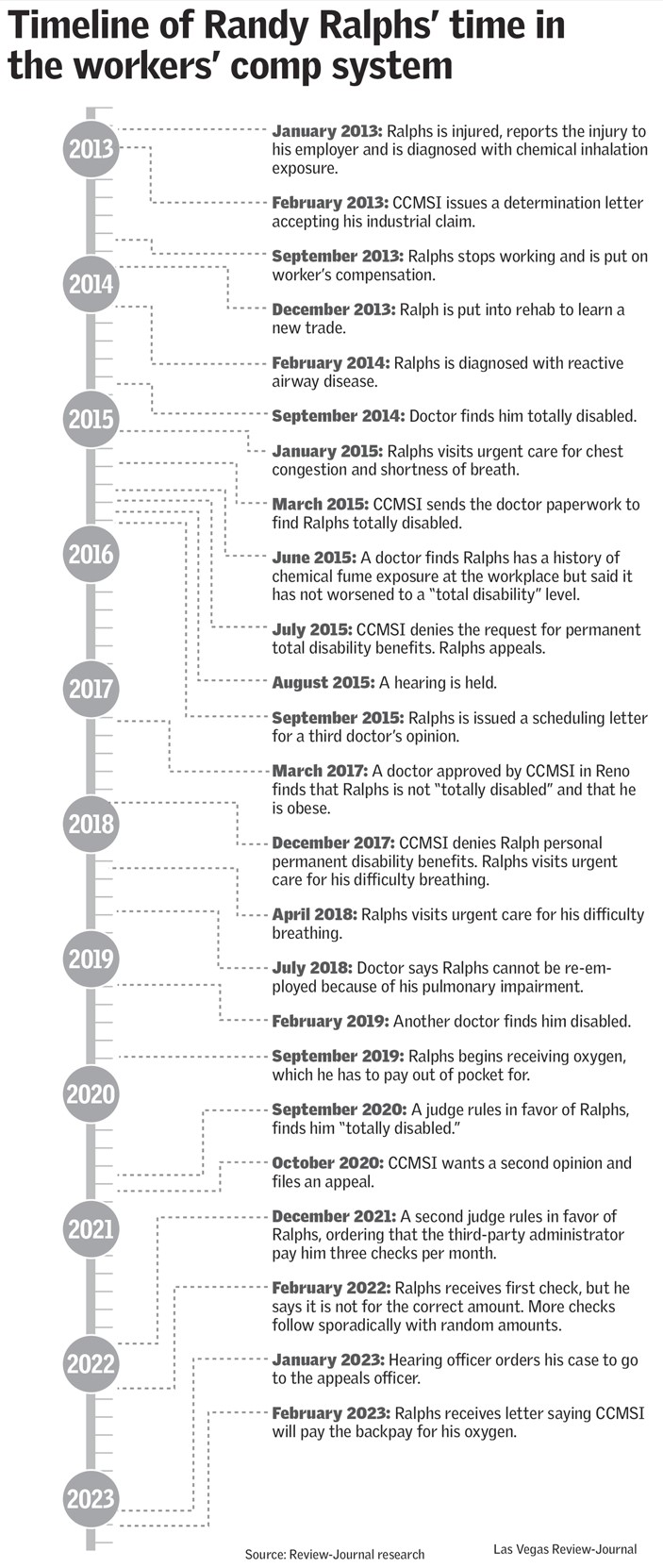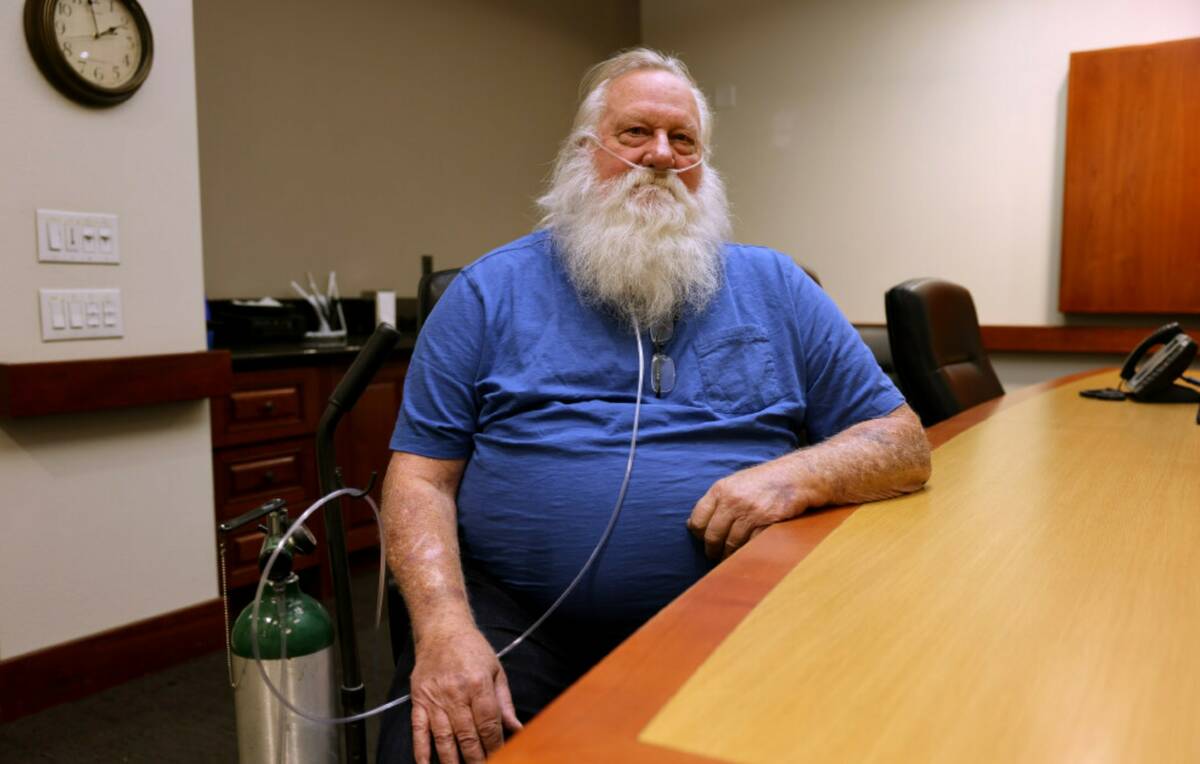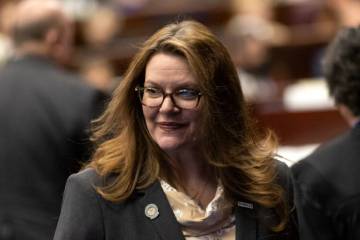Proposed legislation aims to help injured workers in Nevada
After Kim Frankel was injured in 2020 while on duty as a detective for the Washoe County sheriff’s office and diagnosed with a movement disorder, she fought hard to get compensation.
Even after she won her workers’ compensation case, she still has not received treatment for her condition.
She hopes legislation that she pushed Sen. Skip Daly, D-Sparks, to sponsor in the 2023 Legislature will help her and other people who have been stuck in the workers’ compensation system with nowhere to go.
Frankel first spoke to the Review-Journal after it published a story about the backlog of injured worker cases in the state. Many workers have had to wait months or even years for treatment after an injury and have struggled to get their cases across the finish line.
“The messages that I got from injured workers from all over and all walks of life, you know, from nurses to construction workers to store clerks to I mean, you name it (were) just horrific, horrible positions they were put in,” Frankel said. “And so I just thought, ‘Well, why don’t I try to change the law?’”
The bill, which is still being drafted, seeks to allow injured workers to sue insurers if they acted in bad faith, Daly told the Review-Journal.
“I’m hoping we can make a couple of improvements and steps in the right direction to address this issue,” said Daly, D-Sparks.
Targeting bad faith
The bill seeks to sunset the statute that limits the liability of the insurer or third-party administrator to allow “bad faith civil remedies.” The legislation will also raise the thresholds for the penalties from about $5,000 to $15,000, Daly said.
While the goal is to help “everyday people” who are injured and want to get back to work, Frankel said, in the bigger picture, it is about fighting insurance companies and employers. Even though the bill has not been introduced yet, it has already received opposition from insurance companies, Frankel said.
A “bad faith” clause is meant to be a deterrent, Frankel said. There’s a misunderstanding that making Nevada a “bad faith” state would erode the state’s “exclusive remedy,” which means that an injured employee generally cannot sue an employer for work-related injuries if the employer has purchased worker’s compensation insurance, according to the Nevada Division of Industrial Relations. But that is not the case, Frankel said.
“Making Nevada a ‘bad faith’ state is just a deterrent for malicious and retaliatory and intentional mishandling of claims,” Frankel said.
Adam Muslusky, a workers’ compensation specialist and personal injury attorney in Clark County, thinks any attempts to bring back the bad faith clause, which used to exist when the workers’ compensation system was public, will be a “nonstarter at the Legislature.”
“Casinos, gaming, insurance companies are going to fight that all day for obvious reasons,” Muslusky said.
Recourse for workers
For Frankel, having a bad faith process in the state when she was injured would have given her a civil recourse because she believes her claim was handled maliciously, as there was no evidence to support the denial of her claim and the delay of her medical treatment, she said.
When Frankel was hit by a drunk driver while she was on duty as a detective, she got a traumatic brain injury, whiplash and a lumbar strain. Her employer’s insurance, a third-party administrator called Cannon Cochran Management Services, Inc., denied doctors’ recommendations for movement treatment, Frankel said. Her symptoms worsened, and she was later diagnosed with dystonia, a movement disorder that causes the muscles to contract involuntarily.
“They play God. They are the reason I am permanently disabled for life,” Frankel said. “When you have an open and accepted claim, you cannot just go use your private health care insurance.”
Currently, the only recourse for an injured worker is to file a benefit penalty through the Division of Industrial Relations, Frankel said.
“I actually did that, and (the insurance company) got fined for their mismanagement of my case,” Frankel said. “And where is that now? It still hasn’t gotten me treatment. It’s in appeal. … They just continue to tie up the court system through appeal.”
Victoria “Tori” Carreón, administrator of the Nevada Division of Industrial Relations, said the agency is responsible for ensuring that employers have workers compensation coverage, and that insurers are complying with the law. The regulatory agency audits every insurer every five years to make sure they are in compliance. Benefit penalty cases are complex and involve a lot of adjudication, Carreón said.
“I’m still sitting out here on my own, I can’t sue my insurance,” Frankel said. “I’ve had to pay cash and seek out my own treatment.”
Contact Jessica Hill at jehill@reviewjournal.com. Follow @jess_hillyeah on Twitter.



















